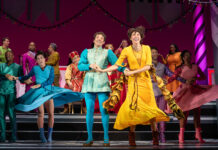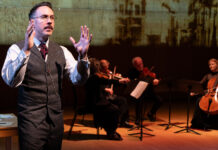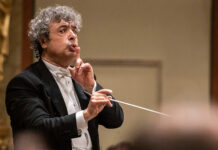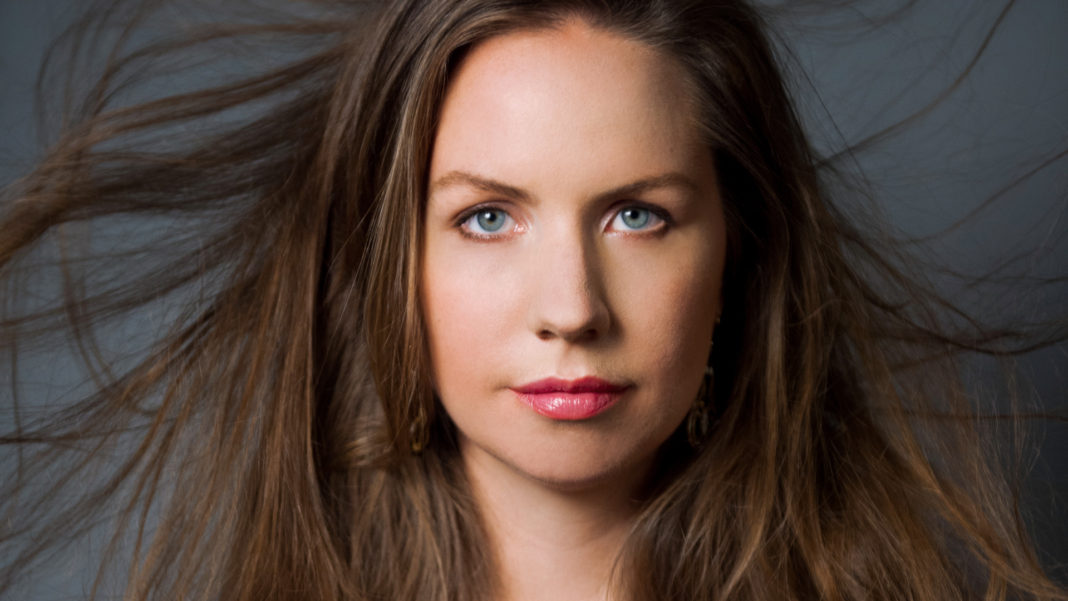It was Yuval Sharon’s idea. The interim Artistic Director for Long Beach Opera (James Darrah was recently named the new Artistic Director) came up with the idea of pairing two works featuring female singers that were separated by a century. Those works are Arnold Schoenberg’s Pierrot Lunaire and Voices from the Killing Jar by Kate Soper. They will be performed on the same program at The Ford in Los Angeles this Saturday and Sunday.
Soper used the stories of eight women from fiction, written by men, to explore how they were treated by their creators in her work which is a song cycle for voice and ensemble. Amongst the sources and characters to be found are Lady MacDuff from Shakespeare’s Macbeth, Emma Bovary from Gustave Flaubert’s Madame Bovary and Daisy Buchanan from F. Scott Fitzgerald’s The Great Gatsby. Jenny Wong will be leading Wild Up! in these performances.
Last week I spoke by phone with Soper about Voices from the Killing Jar and how timely the work feels now nearly ten years after she composed it. What follows are excerpts from that conversation that have been edited for length and clarity.
A decade after completing Voices from the Killing Jar, what are your thoughts about the work and your relationship to it?
I guess I do sort of think of it as a piece from an earlier time, but in terms of my relationship, it has changed. I think it was the start of me becoming more interested in works that had explicit theatrical elements and a legible kind of quasi-narrative element. And it was really a chance for me to really see how versatile I could be as a performer. I think those are all the things that I kind of tried out for the first time with that piece that have become just part of my regular practice. I think like all pieces of music – probably for most composers – it’s also a record of a time in my life that had its interesting things. A time when I was really connected to the ensemble I was working with and I was finding my compositional voice as they say.
Do you think the #MeToo movement in some way now makes this work more prescient and more topical?
That’s not for me to say. That’s probably just for people receiving the work now to say. Of course, I have thoughts and sadnesses about how things have changed even since I wrote that piece. And in a way I think things haven’t gotten better necessarily with regard to gender equality.
Here we are on the call and you ask me about #MeToo. Of course, I get it. I’m not upset or even surprised that you would bring that up. But I don’t know. If people who are not in the majority point of view, everyone who’s not the straight white man, it’s like I did write this piece about these female characters. So I can’t really say that it doesn’t involve gender or my feelings about it or that it would be inappropriate for you or anyone else to want to talk about that in context of the piece.
To be clear, the reason I asked is that there are certain pieces of art that get created and then become more resonant because of what has happened, not as a result of that work necessarily, but just what has happened with time after their debut.
That makes sense.
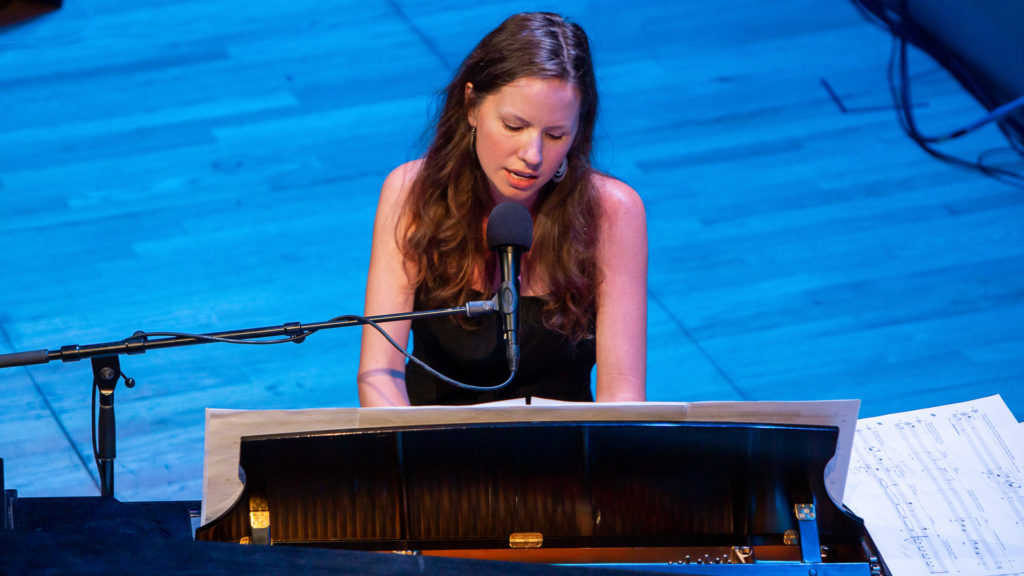
I recently spoke with conductor Ruth Reinhardt and we talked about when it was going to be that a woman is a composer or a conductor and not a woman composer or a woman conductor. Do you see that shift in perspective happening in your lifetime?
I guess I’m not super optimistic about great strides for equality in my lifetime at the moment. This is such specific moment where it’s difficult to be optimistic about cultural shifts.
What was your reaction when Yuval Sharon suggested pairing your work with the Schoenberg?
I think we had talked about a couple different things of mine. I didn’t really realize that they premiered exactly one hundred years apart. That seemed very cool to me; a nice synchrony. I think it makes a lot of sense. They’re both minor dramas. They both have kind of like a weird instrumentation. They both are for unconventional singers. So I’m pleased and honored to be half of that double bill.
How challenging is it for you as a composer to get additional performances of a work beyond a premiere? Many composers with whom I’ve spoken said getting the first performance is easy, but getting the subsequent performances is much more challenging.
I’m very grateful that people are doing my work. Sirens has been done a couple of times and Voices from the Killing Jar, too. I was writing things that I thought would be really fun and challenging for me to do as singer that I wasn’t getting the opportunity to do. I want to be theatrical. I want to play an instrument while I’m up there or whatever. So I think what’s been really gratifying to me is to see other singers say, “that looks really fun and I want to try that” or “I’ve got some friends I want to do this piece with.” I hope that one of the reasons my stuff is sticking around is because it’s just really challenging and interesting and a fun experience for the performers.
As somebody who doesn’t sing, it’s doesn’t look like it’s easy at all.
It’s not easy. As someone who didn’t get a vocal degree and didn’t really start studying voice in any serious way until basically after I wrote for voice, I know it’s possible to do without achieving a higher level of vocality. The singers who tend to do my work tend to have more thorough training than I do. Maybe it’s an opportunity for them to do some of these others thing you don’t encounter in vocal pedagogy.
Composer and teacher Nadia Boulanger said “A great work is made out of a combination of obedience and liberty.” Do you agree with her or is there another way to describe what a great work or a great composition is today?
Well, how do you interpret what she means by that?
That that are certain rules you start following as a composer, but there’s this liberty to go off and do you want to do as well. That it’s this combination of the structure you’re taught and then what you choose to do with it.
Now there’s less of a sense of you’re taught about a certain structure because we’re even much further from any kind of common practice than she was. For me I’m trying to figure out what’s effective and it helps to have some rules. And you can do anything you want. I don’t know that I would say anything in particular is the characteristic of a good work.
I like a really good quote by Iris Murdoch, the novelist. What is it? It’s like the moment from after something is a space where the work hasn’t totally committed itself. Like it’s too late to go back, but it’s too early to say what it is, is like a really important moment. And that genius is when that moment is spread over the whole working process. I think it’s sort of this balance of trying to hone in on it, but also being open to changing your mind and breaking all of your rules at any given moment.
For tickets for Saturday’s performance, please go here. For tickets for Sunday’s performance, please go here.
Photo: Kate Soper (Photo by Liz Linder/Courtesy KateSoper.com)


